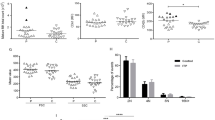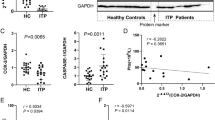Abstract
Essential thrombocythemia (ET) is one of the less rare variants of the chronic myeloproliferative disorders (MPD). The present review questions the possible link between spontaneous megakaryocytopoiesis, platelet hyperreactivity, and the occurrence of platelet-mediated vascular manifestions in acquired and hereditary ET. In acquired ET, the role of thrombopoietin (TPO) is crucial to the observed hypermegakaryocytopoiesis, which is characterized by an increased proliferation of megakaryocyte (MK) progenitors, even in conditions of culture without addition of any known megakaryocyte colony-stimulating factors. An increased reactivity of megakaryocyte progenitors to TPO remains to be precisely delineated. A defective clearance of TPO by megakaryocytes and platelets because of a reduced number of TPO receptors is possible. TPO is able to enhance platelet aggregation induced by ADP, thrombin, and collagen. A point mutation in the TPO gene as the cause of increased TPO production in hereditary ET can readily explain both spontaneous megakaryocytopoiesis and platelet-mediated microvascular manifestations simulating the phenotype of acquired ET. Nevertheless, to date, no mutation of the TPO structural gene, as shown in two families with hereditary ET, and no mutations in the TPO receptor have been found in patients with acquired ET. There is good evidence that the microvascular circulation disturbances in ET are caused by intravascular activation and aggregation of hypersensitive platelets, with sludging or occlusion of the endarterial microvasculature. In this process, the generation of platelet-derived products, endothelial cell damage, fibromuscular intimal proliferation, and platelet thrombi are essential and can be inhibited by a platelet-specific regimen of aspirin, thus providing a rationale for using low-dose aspirin as an antithrombotic agent in thrombocythemia. In contrast, the generation of thrombin appears not to be essential for the formation of platelet thrombi, thereby explaining the inefficacy of coumadin derivatives and heparin in the treatment and prevention of microvascular circulation disturbances in hereditary and acquired ET.
Similar content being viewed by others
Author information
Authors and Affiliations
Additional information
Received: January 7, 1999 / Accepted: July 6, 1999
Rights and permissions
About this article
Cite this article
Bellucci, S., Michiels, J. Spontaneous proliferative megakaryocytopoiesis and platelet hyperreactivity in essential thrombocythemia: is thrombopoietin the link?. Ann Hematol 79, 51–58 (2000). https://doi.org/10.1007/s002770050010
Issue Date:
DOI: https://doi.org/10.1007/s002770050010




